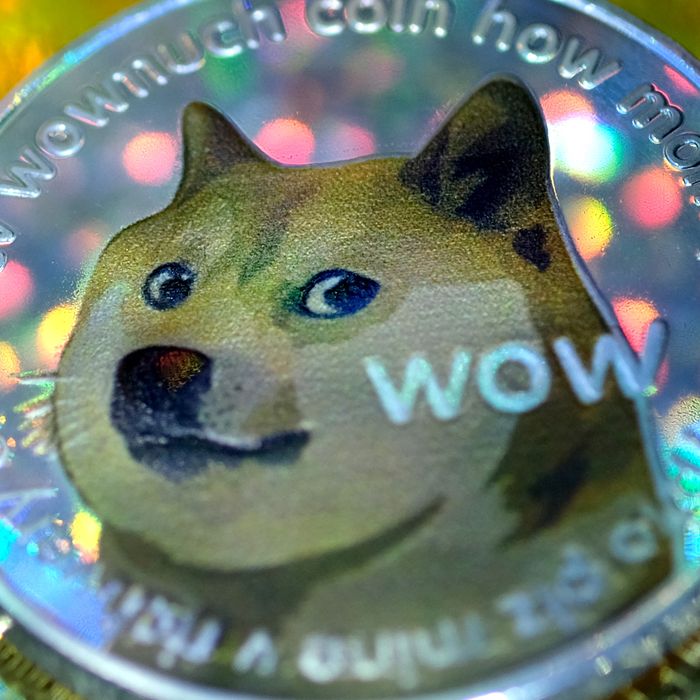
Wow indeed.
Photo: Yuriko Nakao/Getty Images
Dogecoin, the meme cryptocurrency styled after an internet-famous Shiba Inu that was launched as a joke in 2013, is having another hell of a week. The price of the meme crypto had dropped down a bit following April’s dramatic spike, but it surged back up again on Tuesday — briefly hitting an all-time high of $0.60. The popular trading platform Robinhood crashed amid the trading frenzy, just as it had the last time doge-mania struck last month. The Indian crypto platform WazirX briefly went down, as well. And many dogecoin fans and investors are now hoping the hype can build enough to boost the price of the crypto up to a dollar in the coming days.
The spike followed the news that two more big exchanges were opening the doge-door. On Monday, eToro announced that it would allow its 20 million users to trade dogecoin, and on Tuesday, Gemini said it would support the meme crypto for its more than 13 million active users as well, with CEO Tyler Winklevoss extolling dogecoin’s not-hilarious virtues. The two platforms embracing dogecoin not only expand the market for the crypto’s trading, but further legitimize it. According to CoinMarketCap, dogecoin’s current $74 billion market capitalization makes it the fourth-largest cryptocurrency in the world, despite the fact that there is no cap on how much dogecoin can be made — since it was created to be fun, not valuable.
And another reason DOGE is jumping high is because billionaire dogecoin superfan Elon Musk is hosting Saturday Night Live this weekend — and has leveraged the meme to promote it:
Musk seems all but certain to let the doge out somehow on Saturday, and his previous promotion of the crytpo and its memes have led to spikes in demand. “Dogecoin is surging because many cryptocurrency traders do not want to miss out on any buzz that stems from Elon Musk’s hosting of Saturday Night Live,” Oanda senior market analyst Edward Moya said Tuesday.
He also could have said “additional buzz.” Following Tuesday’s spike, dogecoin had seen year-to-date gains of more than 11,000 percent. Put another way by Yahoo Finance’s Zack Guzman, anyone who bought $1,000 in dogecoin at the beginning of the year would have more than $100,000 worth of it on Tuesday:
That math has not been lost on some of the people who sold off their dogecoin before the recent spikes:
For everyone still riding the doge high, however, the meme-fueled excitement, mayhem, and speculation persist:
The other billionaire dogecoin fan, Mark Cuban, published a doge tweetstorm on Sunday in which he insisted the “joke is now legit.” And last week he tried to demystify crypto and dogecoin during a daytime talk-show interview with Ellen DeGeneres:
Cryptocurrency is just an asset to invest in. Bitcoin is kind of like a digital version of gold. Ethereum is a digital version of a currency. And then you got dogecoin, which is just fun. But the weird part about it [is] it went from being a cryptocurrency joke to now becoming something that’s becoming a digital currency.
Cuban said he and his 11-year-old son each bought $30 worth of the crypto, explaining that he thought it was a fun and easy introduction to the world of crypto and investing. “When someone brings up dogecoin to you and asks you if it’s a good investment, I wouldn’t say it’s the world’s best investment, but it’s a whole lot better than a lottery ticket and it’s a great way to learn and start understanding cryptocurrencies.”
He did not get into some important complexities and downsides to dogecoin and crypto to DeGeneres or her viewers, however, as Coindesk’s Cameron Hood noted afterward:
Cuban noted his Mavericks basketball team’s store accepts dogecoin for merchandise, and suggested DeGeneres do the same for her Ellen Shop. (He did not mention that spending even trivial amounts of crypto on goods and services can incur a tax liability in the U.S.) …
Cuban [also] did not mention risk factors such as dogecoin’s unlimited supply and sparse technical development. He did, however, explain one of the realities of trading crypto on regulated platforms: they collect sensitive personal information from users.
Indeed, though the crypto was designed to be fun, and doge-mania and its enthusiasts can be hilarious — would-be DOGE investors also need to be careful. At the same time, it remains unclear what will happen next for the internet’s favorite meme crypto, whether it hits a dollar this week, or whether Elon Musk dons a doge-suit on Saturday, or not. As BlockTower Capital’s Mike Bucella suggested to CNBC on Tuesday, the meme crypto and unique phenomenon it represents could sustain no-joke value:
If there becomes enough of a community around an asset, and that community decides to effectively create long-term value through some form of declining supply cap over time, that could actually equate to a valuable currency. The real value is in today’s meme-driven culture and doge represents the network value of memetics, which may prove to be enormous.


